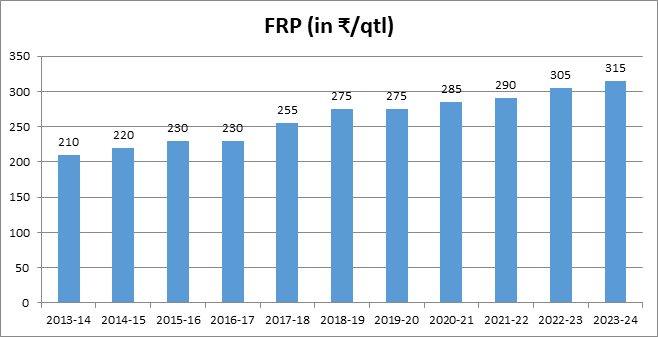Government approves Fair and Remunerative Price of sugarcane payable by Sugar Mills to sugarcane farmers for sugar season 2023-24
No: -- Dated: Jun, 28 2023
Keeping in view interest of sugarcane farmers (GannaKisan), the Cabinet Committee on Economic Affairs chaired by the Prime Minister Shri Narendra Modi has approved Fair and Remunerative Price (FRP) of sugarcane for sugar season 2023-24 (October - September) at Rs.315/qtl for a basic recovery rate of 10.25%. It has also been approved to provide a premium of Rs.3.07/qtl for each 0.1% increase in recovery over and above 10.25%, & reduction in FRP by Rs.3.07/qtl for every 0.1% decrease in recovery.
Further, with a view to protect interest of sugarcane farmers, government has also decided that there shall not be any deduction in case of sugar mills where recovery is below 9.5%. Such farmers will get Rs.291.975/qtl for sugarcane in ensuing sugar season 2023-24 in place of Rs.282.125/qtl in current sugar season 2022-23.
The cost of production of sugarcane for the sugar season 2023-24 is Rs.157/qtl. This FRP of Rs.315/qtl at a recovery rate of 10.25% is higher by 100.6% over production cost. The FRP for sugar season 2023-24 is 3.28% higher than current sugar season 2022-23.
The FRP approved shall be applicable for purchase of sugarcane from the farmers in the sugar season 2023-24 (starting w.e.f. 1st October, 2023) by sugar mills. The sugar sector is an important agro-based sector that impacts the livelihood of about 5 crore sugarcane farmers and their dependents and around 5 lakh workers directly employed in sugar mills, apart from those employed in various ancillary activities including farm labour and transportation.
The FRP has been determined on the basis of recommendations of Commission for Agricultural Costs and Prices (CACP) and after consultation with State Governments and other stake-holders. Details of FRP announced by the Government since sugar season 2013-14 are as under:

Background:
In the current sugar season 2022-23, about 3,353 lakh tons of sugarcane of worth Rs.1,11,366 crore purchased by sugar mills, which is the second highest next to the procurement of paddy crop at Minimum Support Price. The Government through its pro-farmer measures will ensure that sugarcane farmers get their dues in time.
Growth of ethanol as biofuel sector in last 5 years has amply supported the sugarcane farmers and sugar sector, as diversion of sugarcane/sugar to ethanol has led to better financial positions of sugar mills due to faster payments, reduced working capital requirements and reduced blockage of funds due to less surplus sugar with mills, thereby enabling them to make timely payment of cane dues of farmers. During 2021-22, revenue of about Rs.20,500 crore has been generated by sugar mills/distilleries from sale of ethanol to OMCs which has enabled them to clear cane dues of farmers.
The Ethanol Blended with Petrol (EBP) Programme has saved foreign exchange as well as strengthen energy security of the country and has reduced dependence on imported fossil fuel thereby helping in achieving the goal of Atmanirbhar Bharat in petroleum sector. By 2025, it is targeted to divert more than 60 LMT of excess sugar to ethanol, which would solve the problem of high inventories of sugar, improve liquidity of mills thereby help in timely payment of cane dues of farmers and will also generate employment opportunities in rural areas. Use of ethanol with petrol would reduce pollution and improve quality of air.
Proactive and farmer friendly policies of the Government has led to promotion of interest of farmers, consumers as well as workers in sugar sector improving livelihood of more than 5 crore persons directly and all the consumers by making sugar affordable. As a result of proactive policies of Government the sugar sector has now become self-sustainable.
India is now playing a crucial role in the global sugar economy as it is the second largest exporter of sugar in the world. In sugar season 2021-22, India has also become largest producer of sugar. It is expected that India would become third largest ethanol producing country in the world by 2025-26.
Courtesy – Press Information Bureau, Government of India
